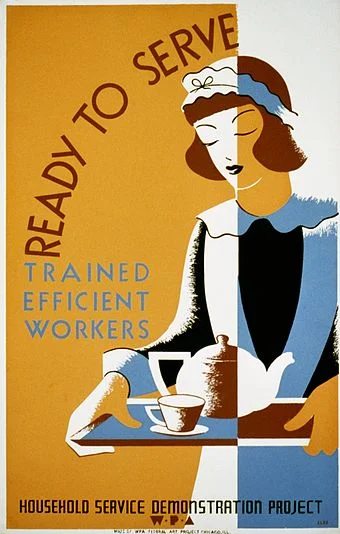Chris Powell: Government employees above the law in Conn.
Not always? WPA poster from the Great Depression.
What happens when someone asserts that the compensation of members of state and municipal government employee unions, being the biggest expense of government in Connecticut, should be determined through the ordinary democratic process and not through secret negotiations between unions and politicians or by the decisions of unelected arbiters who answer to no one?
When that happens the unions shriek: You hate working people!
What happens when an academic study concludes that the compensation of Connecticut's state and municipal government employees is far more generous than that of most states because it is determined by a system that puts the government employee unions above the law?
The political allies of those unions, like state Senate's Democratic leader, Bob Duff of Norwalk, let loose the same shriek: You hate working people!
Such a study was published the other day by the Yankee Institute for Public Policy and Duff accused it of trying to "dismantle the middle class for the oligarchy" and to create an economy "where everyone works for a minimum wage."
Of course this shrieking fails to addresses the issues being raised. It aims to prevent those issues from being addressed. But thanks to the Yankee Institute study, at least those issues now are in the spotlight.
The study, "Above the Law," by Priya Abraham Brannick of the Pennsylvania-based Commonwealth Foundation for Public Policy Alternatives and F. Vincent Vernuccio of the Mackinac Center for Public Policy, in Michigan, is indisputable in its basic points:
-- Connecticut law subjects to collective bargaining more of the compensation and working conditions of state and municipal employees than most other states do.
-- Binding arbitration of state and municipal employee union contracts in Connecticut prevents elected officials from exercising much authority over the terms of government employment. Indeed, that is the very point of binding arbitration: to diminish the authority of elected officials.
-- Connecticut law even allows state and municipal employee union contracts to take precedence over state law. For example, while ordinarily the disciplinary records of government employees are public records, union contracts can nullify the public's right to know so misconduct and incompetence on the public payroll can be concealed.
Nobody should feel sorry for Connecticut's elected officials because of this. They don't want authority over the biggest costs of government. They don't want to get caught between taxpayers and the government employee unions. As employee compensation cannibalizes the government, Connecticut's elected officials want to be able to shrug and say they can't do anything about it, though this inability to control the costs of government employment is a primary driver of the state's disastrous decline.
Democratic elected officials especially don't want the government to regain control of its employment costs, because their party is dominated by the government employee unions.
But collective bargaining for government employees and binding arbitration of their union contracts should be repealed because they destroy democracy and their premise is that the only working people are those on government's payroll, that people who merely pay taxes are properly slaves.
So why do Connecticut's government employee unions hate taxpayers so?
Chris Powell is a columnist for the Journal Inquirer in Manchester, Conn., and a frequent contributor to New England Diary.
